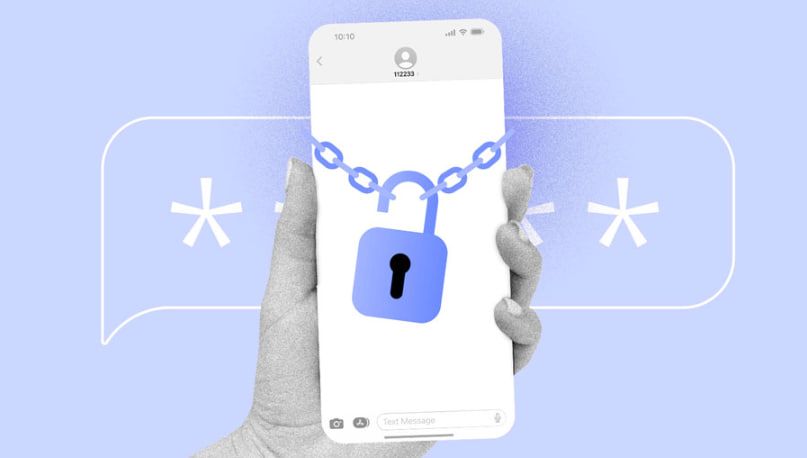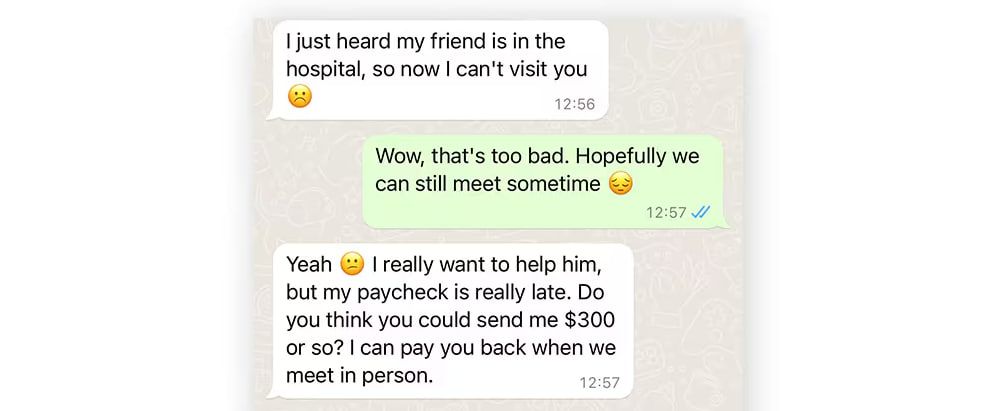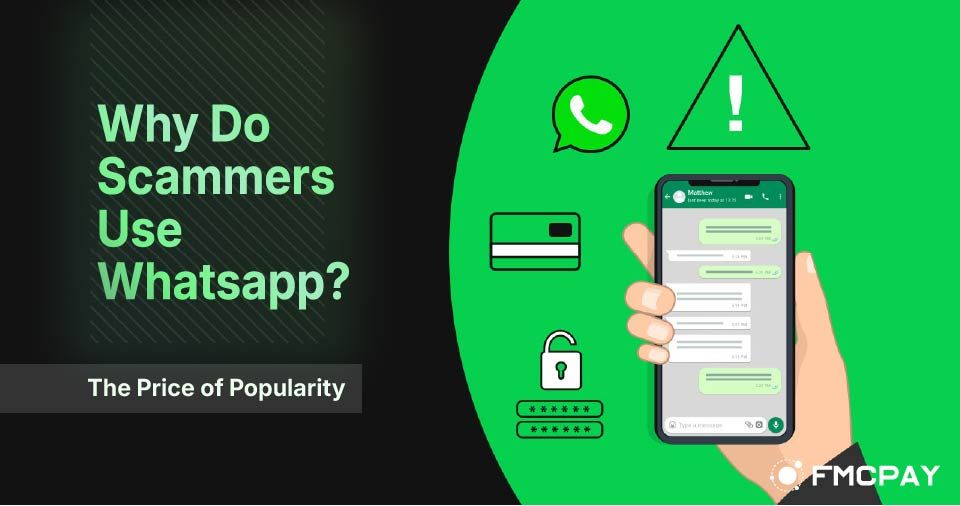In an era where digital communication reigns supreme, WhatsApp has emerged as one of the most popular messaging platforms globally. However, this unprecedented success has attracted unwanted attention from cybercriminals, leading many to question why do scammers use WhatsApp with increasing frequency.
Join FMCPAY in this article to explore WhatsApp’s technological advantages and the other factors behind its popularity with scammers.
1. Brief Overview of WhatsApp
When Jan Koum and Brian Acton founded WhatsApp in 2009, they likely never imagined it would become the communication giant it is today. With over 2 billion active users spanning 180 countries, WhatsApp has revolutionized how we connect with friends, family, and businesses.
The platform’s journey from a simple messaging app to a global phenomenon caught the attention of Meta (formerly Facebook), leading to a historic $19 billion acquisition in 2014.

WhatsApp’s success stems from its user-friendly interface and innovative features. As we explore why do scammers use WhatsApp, it’s important to note that the introduction of end-to-end encryption in 2016 marked a significant milestone, promising users enhanced privacy and security.
Free international messaging, voice calls, and video calls have made it an indispensable tool, particularly in developing nations where traditional communication methods can be costly and unreliable.
2. Why Do Scammers Use WhatsApp Over Other Platforms?
To understand why do scammers use WhatsApp, first we need to examine the platform’s unique characteristics that inadvertently make it attractive to fraudsters. From its technical infrastructure to psychological factors, multiple elements combine to create an environment where scams can flourish.
2.1 Phone Number-Based Authentication
At the heart of why do scammers use WhatsApp lies its phone number-based system, which has become both a blessing and a curse for user security.
Unlike email-based platforms, WhatsApp requires users to register with a phone number, creating an illusion of authenticity that scammers exploit masterfully. When people receive messages from a “real” phone number, they’re more likely to let their guard down.
Cybercriminals capitalize on this trust through various methods. They frequently use disposable numbers and burner phones, making them virtually untraceable. Virtual phone services and VoIP technologies provide them with endless possibilities for creating new identities.
Some sophisticated scammers even employ SIM swapping techniques to steal legitimate phone numbers. Through systematic number generation, they can target masses of users simultaneously, and by using specific area codes, they can tailor their scams to particular regions.

2.2 User Interface and Social Proof
WhatsApp’s interface provides scammers with multiple psychological triggers that make their schemes more convincing. Status indicators showing when someone is online, typing, or has read a message create a sense of real-time interaction that victims find harder to resist.
The platform’s blue checkmarks for message confirmation add legitimacy to their communication. Business verification badges can be manipulated or falsely obtained, lending credibility to fraudulent operations. Profile pictures, status updates, and group participant lists all serve as tools for creating elaborate fake personas or impersonating legitimate contacts.
2.3 Privacy Features and Encryption
The platform’s privacy features, while designed to protect users, have become powerful tools for scammers. When analyzing why do scammers use WhatsApp, these security features stand out as particularly advantageous.
The end-to-end encryption makes it impossible for anyone, including WhatsApp itself, to monitor message content. Scammers exploit the ability to hide their ‘last seen’ status and protect their profile photos, making it harder for victims to verify their identity. They create private group chats for mass scamming operations and utilize the disappearing messages feature to eliminate evidence of their activities.
The absence of message history when starting new chats also works in their favor, as it leaves no trail of previous suspicious behavior.

2.4 Global Reach and Accessibility
Another main reason of why do scammers use Whatsapp is because of the platform’s widespread adoption, which creates unique opportunities for scammers. As of October 2024, WhatsApp serves over 2.7 billion active users worldwide. Its cross-border communication capabilities and support for multiple languages allow criminals to operate internationally without barriers.
The low cost of operation makes it an attractive choice for fraudsters, as they can reach potential victims without significant investment. The platform’s availability across all major devices and operating systems, combined with its simple account creation process, enables scammers to quickly establish and maintain multiple fraudulent identities.
2.5 Limited Oversight and Control
Why do scammers use WhatsApp? Because despite their best efforts, the platform still faces some inherent structural limitations in fully preventing fraud. Even when scammers are blocked, they can easily create new accounts and continue their operations.
Cross-border law enforcement proves particularly challenging, often resulting in delayed responses to threat reports. The verification process for business accounts has vulnerabilities that scammers can exploit.
The platform’s inability to monitor encrypted messages means that fraudulent activity often goes undetected until it’s too late. The challenge of implementing effective automated scam detection within an encrypted environment further compounds these issues.

2.6 Integration with Other Platforms
WhatsApp’s connectivity with other services provides scammers additional vectors for attack. The platform’s integration with social media allows criminals to extend their reach and validate their fake identities across multiple platforms. Business API integration can be exploited for large-scale scamming operations.
In countries where WhatsApp offers payment systems, scammers can more easily execute financial fraud. Cloud backup vulnerabilities and web version exploits provide additional opportunities for account takeovers. The platform’s automatic contact sync with phone directories and location sharing features give scammers access to valuable personal information they can use to make their schemes more convincing.
Each of these characteristics contributes to making WhatsApp an attractive platform for scammers. Understanding these elements helps users better protect themselves while continuing to enjoy the platform’s legitimate benefits.
3. Common Types of Scams on WhatsApp
To fully understand why do scammers use WhatsApp for various schemes, let’s examine the most common types of fraud occurring on the platform. The variety of scams proliferating on WhatsApp reveals why do scammers use WhatsApp as their preferred platform.
3.1 Impersonation Scams
Understanding why do scammers use WhatsApp becomes clearer when examining their most effective tactic: impersonating trusted contacts. Scammers hack existing accounts or create convincing duplicates, then contact the victim’s connections with urgent requests for money. They might claim to be in an emergency situation, stranded abroad, or facing a medical crisis.
These scams are particularly effective because they exploit the platform’s personal nature and people’s natural instinct to help loved ones in distress. Criminals often research their targets through social media, incorporating personal details that make their stories more believable.
3.2 Financial Investment Schemes
The rise of investment-related fraud demonstrates why do scammers use WhatsApp for financial schemes. These scams often begin with unsolicited investment advice or exclusive opportunities. Fraudsters create elaborate facades, including fake trading platforms, manipulated screenshots of profits, and testimonials from supposed successful investors.
Cryptocurrency scams are particularly prevalent, with criminals exploiting many people’s limited understanding of digital currencies. They often establish professional-looking groups and channels where they share market analysis and false success stories, gradually building trust before executing their fraud.
Related topics:
- 9 Most Common Cryptocurrency Scams & How to Avoid Them
- How to Avoid Crypto Scams? | Beginner Tips for Safe Trading
3.3 Romance and Relationship Scams
Romance scams on WhatsApp represent a particularly insidious form of fraud that can continue for months or even years. Scammers create attractive profiles using stolen photos and carefully crafted backstories. They exploit WhatsApp’s voice and video call features, often using clever techniques to avoid showing their real faces while maintaining the illusion of genuine interaction.
Over time, they build emotional connections with their victims, sharing fictional personal struggles that eventually lead to requests for financial help. These scams frequently target older or lonely individuals, causing both financial and emotional trauma.

3.4 Business and Employment Fraud
Professional scammers have mastered the art of creating fake business opportunities on WhatsApp. They advertise lucrative work-from-home positions, freelance gigs, or exclusive business partnerships. These schemes often require victims to pay upfront fees for training materials, software, or registration costs.
Some scammers create entire fake companies, complete with professional-looking websites and documentation. They might also impersonate legitimate businesses, exploiting WhatsApp’s business features to appear credible.
3.5 Phishing and Identity Theft
Sophisticated phishing operations on WhatsApp often begin with messages that appear to be from legitimate services like banks, delivery companies, or government agencies. These messages typically contain urgent calls to action and links to fake websites designed to steal personal information.
Scammers increasingly use QR codes and shortened URLs to disguise malicious links. They might also exploit WhatsApp’s document-sharing feature to distribute malware-infected files.
3.6 Prize and Lottery Scams
These scams typically involve notifications of winning a contest or lottery that the victim never entered. Scammers create convincing messages using official-looking logos and documentation. They often claim to represent well-known brands or organizations, promising substantial prizes in exchange for small processing fees.
Some variations include fake shopping vouchers, free airline tickets, or exclusive product offers. The scammers usually pressure victims to keep their “win” confidential while rushing them to pay various fees or taxes to claim their non-existent prize.

3.7 Technical Support Fraud
This increasingly common scam involves criminals posing as WhatsApp technical support or security team members. They might claim the victim’s account has been compromised or flagged for suspicious activity.
These scammers often use urgency and fear to convince victims to share verification codes or download harmful applications. Some variations include offers to verify accounts, upgrade to premium features, or restore supposedly disabled services.
Each of these scam categories continues to evolve as criminals develop new tactics to exploit WhatsApp’s features and its users’ vulnerabilities. Awareness of these schemes and their warning signs remains the best defense against becoming a victim.
4. Steps to Take After Falling for WhatsApp Scams
For victims wondering why do scammers use WhatsApp and what to do after being scammed, immediate action is crucial. The first step is documenting all communication with the scammer, including screenshots of messages, call logs, and any financial transactions. This evidence becomes vital for law enforcement and fraud recovery efforts.
Contact your bank immediately if you’ve shared financial information or sent money to a scammer. Many financial institutions have dedicated fraud departments that can help freeze accounts and potentially recover funds if notified quickly enough. File reports with both your local police and national cybercrime units, as this creates an official record and helps authorities track scamming patterns.
WhatsApp users should also report fraudulent accounts directly through the app. While this won’t recover lost funds, it helps protect other potential victims. Change all passwords associated with your WhatsApp account and any other potentially compromised accounts. Enable two-factor authentication on your WhatsApp account to prevent future unauthorized access.
Conclusion
While WhatsApp’s features and widespread adoption have made it an invaluable tool for billions of users, these same characteristics attract criminals seeking to exploit the platform’s reach and trusted status.
Understanding why do scammers use WhatsApp is the first step in protecting yourself and your loved ones from falling prey to these increasingly sophisticated scams. Stay tuned with news and crypto insights from FMCPAY to stay ahead of emerging threats, improve your digital security, and make informed decisions when navigating today’s digital landscape.

